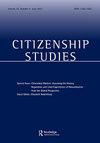Organic vs. inorganic citizenship
IF 1.9
3区 社会学
Q3 POLITICAL SCIENCE
引用次数: 0
Abstract
ABSTRACT Social contract theories from John Locke to John Rawls are rooted in a flawed ontological foundation as autonomous, self-interested individuals with interests/rights abstracted from any relationship to each other, land/animals they live on/amongst or even time/history live within a state of nature or original position. Political authority and/or fundamental principles of justice are produced as inorganic artifices, constituted via the aggregate consent of natural/pre-political beings. While citizenship may appear universal, in reality, ‘freemen’ were defined along gendered, racialized, class-based, and/or ableist lines. Thus, a hierarchically defined subset of people consents to authority or the principles of justice. In contrast, an organic theory of citizenship is rooted in the opposite ontological premise with human beings understood to be living, growing interdependent beings born into relationships and ecosystems that pre-exist and upon which they depend to live at all, are explicitly anti-hierarchical. Relations between people, society, and the ecosystem must be theorized as a priority rather than bracketed outside of consideration and/or constituted as the byproduct of consent. The central question for an organic theory of citizenship is thus: how to create a healthy ecosystem and non-hierarchical set of relations so humans from birth to old age, creatures, and the earth itself are all able to flourish interdependently?有机公民与无机公民
从约翰·洛克到约翰·罗尔斯的社会契约理论根植于一个有缺陷的本体论基础,即自主的、自利的个人,他们的利益/权利从彼此之间的任何关系、他们生活在其中的土地/动物甚至时间/历史中抽象出来,生活在自然状态或原始状态中。政治权威和/或正义的基本原则是作为无机机器产生的,通过自然/前政治存在的总体同意构成。虽然公民身份似乎是普遍的,但实际上,“自由人”是按照性别、种族、阶级和/或能力主义来定义的。因此,按等级划分的人的子集同意权威或正义原则。相比之下,公民身份的有机理论根植于相反的本体论前提,人类被理解为活着的,越来越相互依赖的生命,出生在预先存在的关系和生态系统中,他们完全依赖于这些关系和生态系统生活,是明确反等级的。人、社会和生态系统之间的关系必须被理论化,作为优先事项,而不是被置于考虑之外和/或被构成为同意的副产品。因此,公民有机理论的核心问题是:如何创造一个健康的生态系统和一套无等级的关系,使人类从出生到老年,生物和地球本身都能够相互依赖地蓬勃发展?
本文章由计算机程序翻译,如有差异,请以英文原文为准。
求助全文
约1分钟内获得全文
求助全文
来源期刊

Citizenship Studies
POLITICAL SCIENCE-
CiteScore
3.60
自引率
11.10%
发文量
85
期刊介绍:
Citizenship Studies publishes internationally recognised scholarly work on contemporary issues in citizenship, human rights and democratic processes from an interdisciplinary perspective covering the fields of politics, sociology, history and cultural studies. It seeks to lead an international debate on the academic analysis of citizenship, and also aims to cross the division between internal and academic and external public debate. The journal focuses on debates that move beyond conventional notions of citizenship, and treats citizenship as a strategic concept that is central in the analysis of identity, participation, empowerment, human rights and the public interest.
 求助内容:
求助内容: 应助结果提醒方式:
应助结果提醒方式:


